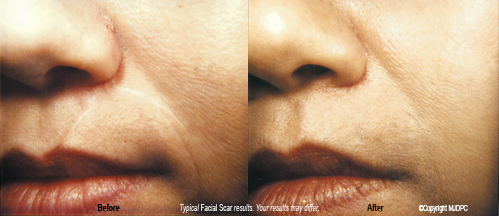Scar and Stretch Mark Removal
Unsightly scars and stretch marks have presented problems for men and women for centuries. Scars and stretch marks are generally considered unsightly, disfiguring and unacceptable by many people. Scar and stretch mark treatments are performed by our medical providers for patients in our region.

What causes scars & stretch marks?
Scars form as part of the skin’s healing process whenever multiple layers of skin are injured. The injury may be the result of an accident, surgery, a burn or even severe acne.
While the exact cause of stretch marks is unknown, it is thought that they are the result of your skin’s collagen and elastin breaking down under stress. Pregnancy, body building and weight loss are the leading causes of stretch marks. Stretch marks occur most frequently in areas of mechanical stress such as the breasts, abdomen, thighs, groin or buttocks. In the beginning, stretch marks are red. They turn white as part of the healing process.

Do laser treatments for scars and stretch marks work?
Our current laser technology has been shown to improve or eliminate red or raised scars. Recent studies have demonstrated that laser treatments stimulate the production of collagen and improve or eliminate the appearance of stretch marks.
Additional studies show that the appearance of stretch marks continues to improve over a period of time ranging from 3 – 6 months after the laser treatment was given. Even those treatments that showed little if any initial improvement showed as much as a 50% improvement at their 6-month checkup.
Treatment options
Today, several new ablative, non-ablative, and fractional lasers are available to treat a wide variety of scars and stretch marks.
Erbium and Carbon Dioxide ablative lasers have been used to treat scars. These procedures provide excellent results however they may require some post-care and some downtime with prolonged redness and swelling.
With non-ablative lasers, the surface of the skin remains undamaged resulting in minimal recovery but with less dramatic results, often with multiple treatments required. New Fractional Lasers provide similar results to ablative lasers with no post-care or downtime, but may require additional treatments.
Stretch marks often respond to safe and somewhat effective Pulsed Dye Laser therapy. This therapy requires many treatments to improve stretch marks. Topicals are often prescribed to enhance the treatment.
Who are the best candidates for laser scar and stretch mark treatment?
The patients that respond the best to laser treatment for scars and stretch marks are those with fair complexion, with light pigmentation and shallow scars or stretch marks.
What else can be used to treat scars?
A variety of silicone gels or sheets that can be applied to the skin form a micro-thin layer of silicone on the scar that enable it to heal quickly, safely and effectively. They can be worn under cosmetics and clothing and are easily tolerated by children. The silicone is thought to moisturize the skin, reduce capillary irritation and allow the skin to return to its normal texture.

Do laser scar and stretch mark treatments hurt?
Most patients do not require an anesthetic. Some patients have indicated that they feel a slight tingling when the laser pulses, or that the laser pulse feels like the snap of a rubber band against the skin.
What should you expect after laser treatment for scars and stretch marks?
After our medical providers perform your scar and stretch mark treatments, results may vary from patient to patient and may not be immediate. Results from laser and stretch mark treatment are generally progressive and may require multiple treatments. If you respond to the first treatment your second treatment will be as good as the first, and the third treatment will be almost as good. About 70% of patients receiving laser treatments for their stretch marks notice a marked improvement. New and shallower stretch marks and scars respond better than older and deeper scars and stretch marks. To enhance the results of your laser treatment your surgeon may recommend the use of tretinoin cream or a glycolic acid cream prior to and after your laser treatment.